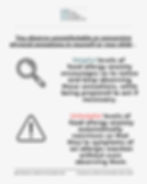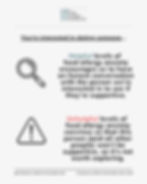Helpful vs Unhelpful Food Allergy Anxiety
- May 31, 2025
- 5 min read
Updated: Dec 10, 2025

Thanks to a suggestion from a friend on social media, I recently shared a post on my Food Allergy Counselor social media accounts exploring what helpful levels of food allergy anxiety versus unhelpful levels of food allergy anxiety looked like in practical terms.
In this article, I'm sharing that content, and also adding useful tips to help you guide your food allergy anxiety back to useful levels so that it's a helpful tool rather than a problematic roadblock in your life.
Helpful Versus Unhelpful Food Allergy Anxiety: Can You Tell the Difference?






My Top Tip to Help Guide Your Anxiety From Unhelpful Back to Helpful.
Here is my top tip for helping people guide their food allergy anxiety from unhelpful back to helpful levels:
"Remember that the presence of anxiety (about food allergies or otherwise) doesn't automatically mean something is unsafe to be doing or experiencing."
This is an important thing to remember since an anxious mind will try to convince you that anxiety is there ONLY because your biggest fears will come true - which, when living with or parenting a child with food allergies, usually means a life-threatening allergic reaction.
But we can feel anxious for other reasons, such as when we're doing something new, we don't know the outcome, or when something feels challenging but important for us to do. (For more on this specific topic, including extra tips, check out my article "Food Allergy Anxiety: Does it Always Mean Something is Unsafe?")
Widening your perspective from "Anxiety is definitely here because something is unsafe" to "Anxiety could be here because something is unsafe, but could also be here because of other reasons, such as this being a new experience for me" helps you create enough space for your mind to explore the anxiety and then choose how you want to respond to it, and hopefully not automatically avoid experiences all together just to quiet the unhelpful anxiety.
5 Practical Actions to Help You Turn Unhelpful Anxiety Into Helpful Anxiety.
Calm your mind and body.
It may feel like anxiety only shows up in our mind with anxious thoughts swirling around, but it can also show up in our body, too! That's true for all emotions. Try this - the next time you're feeling hooked by an emotion, especially anxiety, I encourage to notice how your body feels. What feels tight or uncomfortable when you're anxious, sad, or mad? What feels loose and light when you're connecting with joy? Especially when experiencing anxiety, it's helpful to send signals to both your mind and body that you're safe and don't need to panic. You can do this by simply engaging in belly breathing or focusing on grounding yourself in the present moment via your senses. Try 5-finger breathing by inhaling for 4 seconds as you trace up your fingers and exhaling for 6 seconds as you slowly trace down your fingers, and making sure that both your chest and belly are expanding and deflating. Next, try noticing what you can see, hear, touch, smell, and taste. When we engage in grounding exercises like these, it helps both our mind and body feel safer and less hooked by big emotions, which then allows you to bring anxiety back to more helpful levels. (You can find lots of different breathing, grounding, and calming strategies online, so experiment with them until you find ones you like!)
Practicing food allergy management skills helps manage food allergy anxiety.
Because anxiety is often fueled by unpredictability and unknowns, one of the best practical actions you can take to help manage food allergy anxiety is practicing food allergy management skills. As you continue practicing how to understand your emergency action plan, use epinephrine devices, and plan/prepare for various scenarios, you'll gain competence in these skills, which increases your confidence in your ability to keep yourself safe. This all helps you remind your anxious mind that you have management skills and emergency tools to help you effectively navigate situations that make you feel anxious. (For parents of kids/teens with food allergies, this also includes allowing your child to practice age-appropriate food allergy management skills to help your anxiety levels, as well as theirs).
Tap into your courage.
Courage means having the willingness to do something even when you may not know the outcome. Therefore, being courageous means that even though your mind is fueling the unhelpful anxiety by trying to convince you that all experiences that make you feel anxious are completely unsafe, you are still willing to pursue meaningful and safe enough experiences even when you feel anxious. Each time you do this, you'll help your mind gain a better understanding that the presence of food allergy anxiety doesn't always mean things aren't safe enough for you to experience.
Talk with your allergist and allergy care team.
This is typically an action I always recommend when it comes to managing food allergy anxiety, and for good reason. That's because often times, what's at the core of the anxiety might be misinformation, knowledge gaps, or not knowing how to accurately evaluate food allergy risks. Therefore, simply discussing your food allergy anxiety with your healthcare team opens the door to gathering evidence-based information that will help you guide your unhelpful anxiety back to a helpful level so it can be used to help you plan and prepare ahead of experiences rather than stay stuck in worried thinking. (For more on this specific topic, check out my article "Managing Food Allergy Anxiety: 2 Conversations to Have With Your Allergist").
Talk with a licensed therapist.
If you find that even with these strategies in place, your food allergy anxiety is persistently unhelpful and problematic, it's probably a good time to reach out a food allergy-informed therapist to discuss and learn useful coping strategies to add to your toolbox. You can locate a food allergy-informed therapist on the Academy of Food Allergy Counseling's therapist directory (both of which I founded). For parents of food allergic kids/teens in IL and FL experiencing parental food allergy anxiety that's impacting your life, your child's life, or your family's life, please feel free to reach out to me via my private practice website.
Final Thoughts.
Hopefully this article has not only helped you understand that experiencing some food allergy anxiety can be a useful safety tool, but that when it gets to unhelpful levels, it's important to recognize that change, use strategies to guide it back to more manageable levels, and if needed, reach out to your healthcare team and a licensed therapist for more support and guidance.
%20(1920%20x%201280%20px).png)




